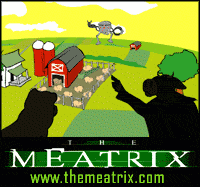
|
| Home | Reading Room | Newsletter | Reminders | Technique | Nursery |
| News | Sustainable Gardening | Trees & Shrubs | Flowers | Composting | Soil |
| Shopping | Tools | Books | How To's | Practical Advice | Children | IPM |
|
Home
Editor's Note: The Independent Science Panel is a group of scientists from many disciplines committed to accountable, accessible and widely participatory science to inform public policy. The ISP is launching a project on sustainable agriculture. They are currently working to produce a report with recommendations for governments on how to make agricultural systems more sustainable.
The Independent Science Panel Current food production system due for collapse. World grain yield fell for four successive years from 2000 to 2003, bringing reserves to the lowest in thirty years. The situation has not improved despite a 'bumper' harvest in 2004, which was just enough to satisfy world consumption.
In too many food production regions of the world, conventional farming practices have severely depleted the underground water to the point where rivers and lakes have dried out, topsoil has been eroded away, and wild life decimated. At the same time, world oil production may have passed its peak; oil price hit a record high of US$58 a barrel on 4 April 2005, and is expected to top US$100 within two years. This spells looming disaster for conventional industrial agriculture, which is heavily dependent on both oil and water. The true costs of our current food production system are becoming all too clear (see Box 1).
The Independent Science Panel (ISP) and the Institute of Science in Society (ISIS) are launching this Sustainable World initiative to engage with all sectors of civil society to make our food production system truly sustainable. We are convening a special ISP group on Sustainable Agriculture (ISP-SA) - currently 18 strong - and a task force of sponsoring organizations and individuals who will make direct input into a comprehensive report on sustainable agriculture at the end of a year. The report will include a series of recommendations for government and inter-governmental agencies on the social, economic and political policy and structural changes needed to implement a sustainable food production system. ISIS and ISP are in a unique position to draw these previously disparate strands together into a powerful scientific and social consensus. We have scientists in many disciplines working together and some of the scientists are competent across several disciplines. A majority of the scientists are already working with grass- roots organisations and local communities in both the developed and developing countries, or are supporting their activities in other ways. There will be a series of consultations (by post or e-mail) with our sponsors, and two to three working conferences throughout the year when the report is being drafted, depending on finances available. A major international conference to launch the final report will take place in 2006. Copies of the report will be sent to all relevant governments and inter-government agencies as the start of a campaign to get the recommendations implemented. Note: The Independent Science Panel consists of dozens of prominent scientists from around the world concerned over the commercialisation of science and the consequent failure of the scientific establishment to protect the public from the hazards of emerging technologies (www.indsp.org/ISPMembers.php). The Panel published its first report, The Case for a GM- Free Sustainable World , in June 2003, documenting scientific evidence of the problems and hazards of GM crops as well as the proven successes and promise of all forms of sustainable agriculture. The report was widely circulated and adopted, and translated into several major languages within a year. It was presented in three successful briefings to government and inter-governmental agencies in 2004, receiving widespread coverage in the popular media.
At the European Parliament briefing in October 2004, ISP delivered its
strongest message: invest in sustainable agriculture right now, as there
is no other way to really feed the world under global warming . The
present initiative is intended to take that message forward.
|
| Reading Room | Trees and Shrubs | Flowers | Composting | Soil | Nursery |
| Shopping | Books | Tools | News | Internet Gardening | Links | Support |
| Vermicomposting | Pest Management | How To's | Practical Advice | Children |
| Home | Newsletter | About Us | Support | Contact |
|
GardenSimply.com | All Rights Reserved 2005 |
|
FREE
Garden Journal!! Join "Garden Notes" and plan for Harvest
Success as you track and record your gardening progress. Your Free Personal
Garden Journal includes printable pages making it easy for you to:
|
|
|
|
|
|
|
|
|
|

|
|
|
|



